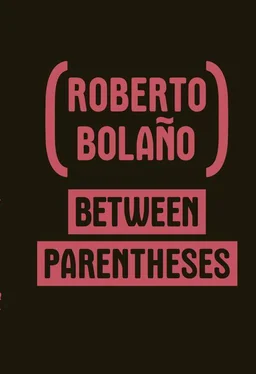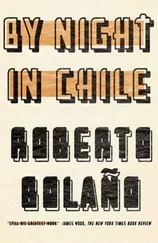Roberto Bolaño - Between Parentheses - Essays, Articles and Speeches, 1998-2003
Здесь есть возможность читать онлайн «Roberto Bolaño - Between Parentheses - Essays, Articles and Speeches, 1998-2003» весь текст электронной книги совершенно бесплатно (целиком полную версию без сокращений). В некоторых случаях можно слушать аудио, скачать через торрент в формате fb2 и присутствует краткое содержание. Год выпуска: 2011, Издательство: New Directions, Жанр: Публицистика, Критика, на английском языке. Описание произведения, (предисловие) а так же отзывы посетителей доступны на портале библиотеки ЛибКат.
- Название:Between Parentheses: Essays, Articles and Speeches, 1998-2003
- Автор:
- Издательство:New Directions
- Жанр:
- Год:2011
- ISBN:нет данных
- Рейтинг книги:4 / 5. Голосов: 1
-
Избранное:Добавить в избранное
- Отзывы:
-
Ваша оценка:
- 80
- 1
- 2
- 3
- 4
- 5
Between Parentheses: Essays, Articles and Speeches, 1998-2003: краткое содержание, описание и аннотация
Предлагаем к чтению аннотацию, описание, краткое содержание или предисловие (зависит от того, что написал сам автор книги «Between Parentheses: Essays, Articles and Speeches, 1998-2003»). Если вы не нашли необходимую информацию о книге — напишите в комментариях, мы постараемся отыскать её.
The Savage Detectives
Between Parenthese
Between Parentheses: Essays, Articles and Speeches, 1998-2003 — читать онлайн бесплатно полную книгу (весь текст) целиком
Ниже представлен текст книги, разбитый по страницам. Система сохранения места последней прочитанной страницы, позволяет с удобством читать онлайн бесплатно книгу «Between Parentheses: Essays, Articles and Speeches, 1998-2003», без необходимости каждый раз заново искать на чём Вы остановились. Поставьте закладку, и сможете в любой момент перейти на страницу, на которой закончили чтение.
Интервал:
Закладка:
They can’t forgive me for having a voice, Robert, says Lemebel at the other end of the line. Santiago glitters in the night. It looks like the last great city of the southern hemisphere. Cars pass under my balcony and Pinochet is in prison in London. How many years has it been since the last curfew? How many years will it be until the next? They can’t forgive me for remembering all the things they did, says Lemebel. But you want to know what they really can’t forgive, Robert? They can’t forgive me for not forgiving them.
I have the sense that Lemebel and Jorge Arrate wouldn’t get along. Anywhere in Europe, this would be a pity, but in Chile it’s a tragedy too.
And last of all, a true story. I repeat: this isn’t fiction, it’s real, it happened in Chile during the Pinochet dictatorship and more or less everybody (the small and remote “everybody” that is Chile) knows it. A right-wing young woman sets up house with a right-wing American, or marries him. The two of them aren’t just young, they’re good-looking and proud. He’s a DINA (National Intelligence Directorate) agent, possibly also a CIA agent. She loves literature and loves her man. They rent or buy a big house in the suburbs of Santiago. In the cellars of this house the American interrogates and tortures political prisoners who are later moved on to other detention centers or added to the list of the disappeared. She writes, and she attends writing workshops. In those days, I suppose, there weren’t as many workshops as there are today, but there were some. In Santiago people have grown accustomed to the curfew. At night there aren’t many places to go for fun, and the winters are long. So every weekend or every few nights she has a group of writers over to her house. It isn’t a set group. The guests vary. Some come only once, others several times. At the house there’s always whiskey, good wine, and sometimes the gatherings turn into dinners. One night a guest goes looking for the bathroom and gets lost. It’s his first time there and he doesn’t know the house. Probably he’s a bit tipsy or maybe he’s already lost in the alcoholic haze of the weekend. In any case, instead of turning right he turns left and then he goes down a flight of stairs that he shouldn’t have gone down and he opens a door at the end of a long hallway, long like Chile. The room is dark but even so he can make out a bound figure, in pain or possibly drugged. He knows what he’s seeing. He closes the door and returns to the party. He isn’t drunk anymore. He’s terrified, but he doesn’t say anything. “Surely the people who attended those post-coup, culturally stilted soireés will remember the annoyance of the flickering current that made lamps blink and music stop, interrupting the dancing. Just as surely, they knew nothing about another parallel dance, in which the jab of the prod tensed the tortured back of the knee in a voltaic arc. They might not have heard the cries over the blare of disco, which was all the rage back then,” says Pedro Lemebel. Whatever the case, the writers leave. But they come back for the next party. She, the hostess, even wins a short story or poetry prize from the only literary journal still in existence back then, a left-wing journal.
And this is how the literature of every country is built.
Words From Outer Space
So what is Secret Interference ? It’s a clandestinely recorded tape. It’s voices talking and transmitting orders and counter-orders on September 11, 1973. Voices we’ve vaguely heard at some point in our lives, but to which we aren’t able to attach a body, as if they issued from forms without substance. Voices that are echoes of a nebulous fear located in some part of our bodies. Imaginary ghosts. A real fear, and also a vulgar fear.
Some orders are unequivocal: there’s talk about killing on sight, arrests, bombings. Sometimes the men who’re talking make jokes: this doesn’t bring them any closer to us, in fact, it sinks them deeper into an abyss, they’re men who emerge from invisible and imperceptible pits and who, in vaguely military terms, promise to establish order. Despite it all, the humor they flaunt is familiar. A humor that one recognizes and would rather not recognize.
The man who’s talking could be my father or grandfather. The man who’s giving orders could be an old school friend, the bully or the teacher’s pet, the kid no one remembers or the kid we played with just once. In those familiar voices we can contemplate ourselves, at a remove, as if watching ourselves in a mirror. It isn’t Stendhal’s mirror, the mirror that strolls along a path, but it could be, and for many who hear the tape it surely will be precisely that.
At first the voices are indistinguishable. Gradually, however, each begins to acquire a personality, a unique character, though they all bear the common stamp of Chileanness, that is, the common stamp of a childhood wreathed in mist and in something that for lack of a better word we can call happiness. The voices that reach us from outer space aren’t just redesigning the childhood island called Chile: they’re teaching us our reality with the teacher’s rod, they’re asking us to open our eyes and also our ears. They’re the voices of real men. Some — to judge by the way they talk, by their moments of hesitation — are scared, nervous. Others control their emotions and maintain their composure with impressive coldbloodedness. The tape rolls and little by little the voices become familiar, as if they’d always been there, talking to us, threatening us. The image is redundant. In fact, they were always there. They’re the men who ordered a father to sodomize his own son if he didn’t want them both to be killed, the bosses who put live rats into the vagina of a twenty-two-year-old Mirista they called a whore.
And yet it all seems like a game. The voices creep in from our childhood like prankster guardian spirits: anything is possible if God doesn’t exist, anything can be done if it’s in the name of Chile. Some voices raise doubts. Most comply, hesitant. Sometimes their ignorance is staggering. A top commander, in direct communication with another commander, says that from now on, given the importance of the information he has to transmit, he’ll speak in English. As if English were a dead language, or as if no one on the other side spoke English.
There’s no getting around it: these are the voices of our childhood. Chilean voices, as if smuggled into a movie too big for them, voices that relay a message that the speakers themselves don’t quite understand. A conversation on the far side of reality, where conversation is impossible. And yet no matter how many extraordinary deeds are accumulated, the picture we’re left with is tinged with a familiar vulgarity, taken to a sickening degree. At some point in our lives we knew the people who’re talking. The voices are performing for us, as if in a radio serial, but mostly they’re performing for themselves. Pornography, snuff movies. At last they’ve found the roles of their lives. Finally, the soldiers have their war, their great war: before them we stand, unarmed but watching and listening.
A Modest Proposal
Everything would suggest that we’re entering the new millennium under the glowering word abject , which comes from the Latin abjectus , which means lowly or humble, according to Joan Corominas, the sage who spent his last years on the Mediterranean coast, in a town just a few miles from mine.
September 11, 1973, glides over us like the penultimate Chilean condor or even like a winged huemul , a beast from the Book of Imaginary Beings , written by Borges in collaboration with María Guerrero in 1967, in which there is a chapter, “An Animal Dreamed by Kafka,” that literally transcribes the words of the Prague writer. It goes like this: “It is the animal with the big tail, a tail many yards long and like a fox’s brush. How I should like to get my hands on this tail some time, but it is impossible, the animal is constantly moving about, the tail is constantly being flung this way and that. The animal resembles a kangaroo, but not as to the face, which is flat almost like a human face, and small and oval; only its teeth have any power of expression, whether they are concealed or bared. Sometimes I have the feeling that the animal is trying to tame me. What other purpose could it have in withdrawing its tail when I snatch at it, and then again, waiting calmly until I am tempted again, and then leaping away once more?”
Читать дальшеИнтервал:
Закладка:
Похожие книги на «Between Parentheses: Essays, Articles and Speeches, 1998-2003»
Представляем Вашему вниманию похожие книги на «Between Parentheses: Essays, Articles and Speeches, 1998-2003» списком для выбора. Мы отобрали схожую по названию и смыслу литературу в надежде предоставить читателям больше вариантов отыскать новые, интересные, ещё непрочитанные произведения.
Обсуждение, отзывы о книге «Between Parentheses: Essays, Articles and Speeches, 1998-2003» и просто собственные мнения читателей. Оставьте ваши комментарии, напишите, что Вы думаете о произведении, его смысле или главных героях. Укажите что конкретно понравилось, а что нет, и почему Вы так считаете.












